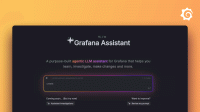This is documentation for the next version of Grafana Alloy Documentation. For the latest stable release, go to the latest version.
otelcol.receiver.cloudflare
EXPERIMENTAL: This is an experimental component. Experimental components are subject to frequent breaking changes, and may be removed with no equivalent replacement. To enable and use an experimental component, you must set the
stability.levelflag toexperimental.
otelcol.receiver.cloudflare receives logs sent by Cloudflare LogPush jobs.
Note
otelcol.receiver.cloudflareis a wrapper over the upstream OpenTelemetry Collectorcloudflarereceiver. Bug reports or feature requests will be redirected to the upstream repository, if necessary.
You can specify multiple otelcol.receiver.cloudflare components by giving them different labels.
Usage
otelcol.receiver.cloudflare "<LABEL>" {
endpoint = "<HOST>:<PORT>"
output {
logs = [...]
}
}Arguments
You can use the following arguments with otelcol.receiver.cloudflare:
When the attributes configuration is empty, the receiver will automatically ingest all fields from the log messages as attributes, using the original field names as attribute names.
Refer to the upstream receiver documentation for more details.
Blocks
You can use the following blocks with otelcol.receiver.cloudflare:
output
RequiredThe output block configures a set of components to forward resulting telemetry data to.
The following arguments are supported:
You must specify the output block, but all its arguments are optional.
By default, telemetry data is dropped.
Configure the metrics, logs, and traces arguments accordingly to send telemetry data to other components.
tls
The tls block configures TLS settings used for a server.
If the tls block isn’t provided, TLS won’t be used for connections to the server.
The following arguments are supported:
If reload_interval is set to "0s", the certificate never reloaded.
The following pairs of arguments are mutually exclusive and can’t both be set simultaneously:
ca_pemandca_filecert_pemandcert_filekey_pemandkey_file
If cipher_suites is left blank, a safe default list is used.
Refer to the Go Cipher Suites documentation for a list of supported cipher suites.
client_ca_file sets the ClientCA and ClientAuth to RequireAndVerifyClientCert in the TLSConfig.
Refer to the Go TLS documentation for more information.
The curve_preferences argument determines the set of elliptic curves to prefer during a handshake in preference order.
If not provided, a default list is used.
The set of elliptic curves available are X25519, P521, P256, and P384.
Exported fields
otelcol.receiver.cloudflare doesn’t export any fields.
Component health
otelcol.receiver.cloudflare is only reported as unhealthy if given an invalid configuration.
Debug information
otelcol.receiver.cloudflare doesn’t expose any component-specific debug information.
Example
The following example receives logs from Cloudflare and forwards them through a batch processor:
otelcol.receiver.cloudflare "default" {
endpoint = "<HOST>:<PORT>"
secret = "1234567890abcdef1234567890abcdef"
timestamp_field = "EdgeStartTimestamp"
timestamp_format = "rfc3339"
attributes = {
ClientIP = "http_request.client_ip",
ClientRequestURI = "http_request.uri",
}
tls {
cert_file = "/path/to/cert.pem"
key_file = "/path/to/key.pem"
}
output {
logs = [otelcol.processor.batch.default.input]
}
}
otelcol.processor.batch "default" {
output {
logs = [otelcol.exporter.otlphttp.default.input]
}
}
otelcol.exporter.otlphttp "default" {
client {
endpoint = env("<OTLP_ENDPOINT>")
}
}Replace the following:
<HOST>: The hostname or IP address where the receiver listens for Cloudflare LogPush requests.<PORT>: The port number where the receiver listens for Cloudflare LogPush requests.<OTLP_ENDPOINT>: The OTLP endpoint URL for your observability backend.
Compatible components
otelcol.receiver.cloudflare can accept arguments from the following components:
- Components that export OpenTelemetry
otelcol.Consumer
Note
Connecting some components may not be sensible or components may require further configuration to make the connection work correctly. Refer to the linked documentation for more details.


